-
Tips for becoming a good boxer - November 6, 2020
-
7 expert tips for making your hens night a memorable one - November 6, 2020
-
5 reasons to host your Christmas party on a cruise boat - November 6, 2020
-
What to do when you’re charged with a crime - November 6, 2020
-
Should you get one or multiple dogs? Here’s all you need to know - November 3, 2020
-
A Guide: How to Build Your Very Own Magic Mirror - February 14, 2019
-
Our Top Inspirational Baseball Stars - November 24, 2018
-
Five Tech Tools That Will Help You Turn Your Blog into a Business - November 24, 2018
-
How to Indulge on Vacation without Expanding Your Waist - November 9, 2018
-
5 Strategies for Businesses to Appeal to Today’s Increasingly Mobile-Crazed Customers - November 9, 2018
Report slams David Cameron for poor war planning in Libya
The 49-page report adds: “The result was political and economic collapse, inter-militia and inter-tribal warfare, humanitarian and migrant crises, widespread human rights violations, the spread of Gaddafi regime weapons across the region and the growth of [ISIS] in north Africa”.
Advertisement
Crispin Blunt, the chair of the committee, said: “This report determines that United Kingdom policy in Libya before and since the intervention of March 2011 was founded on erroneous assumptions and an incomplete understanding of the country and the situation”.
The former French president Nicolas Sarkozy and former British Prime Minister David Cameron were severely criticized for their role in the multinational military intervention in Libya in 2011 and which led to the fall of the Gaddafi regime, in a report of the Foreign Affairs Committee of the British Parliament released Wednesday.
Britain and France led worldwide efforts to help oust Libya’s then-leader Muammar Qaddafi in early 2011, using fighter jets to beat back Qaddafi’s armies and allow rebels to topple the longtime dictator. “We looked at how he chaired the National Security Council and [we found] there was no pause to assess”, Blunt said. Political engagement might have delivered civilian protection, regime change and reform at a lesser cost to the United Kingdom and Libya. “That policy was not underpinned by a strategy to support and shape post-Gaddafi Libya”, the report says.
Mr Cameron did the decent thing in halting his political career amid differences with his successor Theresa May over new grammar schools that may have led to a row within the ruling Tories, or he may have faced the danger of being reduced to an Edward Heath-like sulking existence after Margaret Thatcher’s rise.
The Foreign Office responded to these findings by insisting “Qaddafi was unpredictable, and he had the means and motivations to carry out his threats” against the Libyan population.
A UN Security Council resolution with Arab backing authorized the use of “all necessary means” to protect civilians and enforce a ceasefire and no-fly zone against Gaddafi’s forces. It said the threat from Gadhafi was credible and required a “decisive” worldwide response.
Blunt added: “The worldwide community must now get behind the United Nations-backed Government of National Accord to prevent the country descending into all-out civil war”. Asked if he believed the air-strikes were in Britain’s national interest, he told the BBC: ‘Whether it was in our vital national interest to intervene, I think is a matter for debate.
“The issue isn’t the military campaign, it’s what we failed to do after that, and during, in terms of setting up for the peace”. He resigned as prime minister in June after Britain voted in a referendum to exit the European Union.
Advertisement
“The issue is – was there a strong case for regime change?”





























